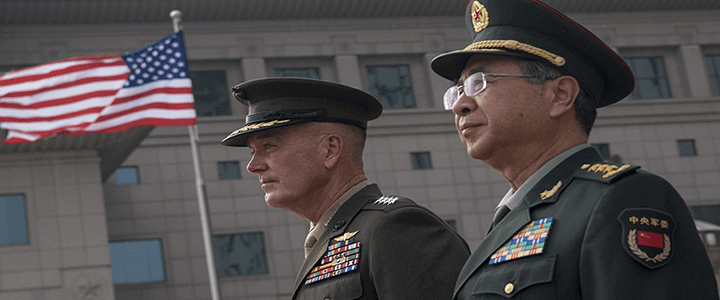While Americans’ eyes were focused elsewhere, Marine Gen. Joseph Dunford, chairman of the Joint Chiefs of Staff, made the most important overseas trip of his tenure when he met with the leadership of South Korea, China and Japan. While the U.S. has many security issues to work through with China — notably their fondness for challenging our surveillance aircraft in international airspace and their militarization of man-made islands in the South China Sea — this trip mostly sends a clear message to Kim Jong-un and his regime in the Democratic People’s Republic of Korea that China and the U.S. are presenting a unified front in opposition to the Hermit Kingdom’s continued nuclear aspirations.
Tensions, and tempers flared after the DPRK tested a new intercontinental ballistic missile. President Trump promised further DPRK aggression would be met with “fire and fury,” and North Korea countering with a threat to fire four missiles into the waters around Guam, where the U.S. has maintained a naval base since 1898, and where strategic bombers rotate for duty in the Pacific theater.
china’s increasing frustration with the dprk
While Trump has routinely criticized the Chinese for what he perceives as a lack of effort to keep the North Korean nuclear program from progressing, the leadership in Beijing have recently shown much more willingness to distance themselves from their satellite state. Amid the recent standoff, the Chinese government, through a state-owned newspaper, warned Pyongyang that while it would support it in the event of a preemptive strike from Washington, should Kim attack the U.S. with nuclear weapons in a first strike, China would “remain neutral.”
That stark warning , along with the realization that the the Terminal High-Altitude Area Defense batteries located in Guam would wend his new missiles tumbling harmlessly into the ocean, undoubtedly encouraged the Koreans to back off their Guam threats.
The Chinese government also announced ahead of Dunford’s visit that it would cut off all imports of coal, iron ore, seafood, and other items covered by the latest round of sanctions enacted by the U.S. Security Council (of which China is a permanent member) the week prior. This measure dealt a significant blow to the DPRK, as the U.S. government has repeatedly charged that Chinese imports of North Korean coal under “humanitarian” exceptions to previous sanctions had not benefited any Korean humanitarian cause but had continued to fund the country’s nuclear program.
dunford inks strategic cooperation deal
The showcase of the chairman’s trip was an agreement between the two countries’ military establishments to improve their communications in times of crisis. Army Lt. Gen. Richard D. Clarke, recently elevated to director for strategic plans and policy on the Joint Staff, will communicate regularly with his Chinese counterpart to “reduce the risk of miscalculation,” a euphemism for accidentally launching a nuclear weapon.
While the new “red phone” arrangement may have been the public centerpiece of Dunford’s visit, there should be little doubt that Korea dominated the talks. The Chinese don’t want to see this escalate any more than anyone else. North Korea owes its very existence to China, but it seems as though Kin Jong-un is somewhat less inclined than his father and grandfather to take his direction from Beijing. That must frustrate the Chinese as much as it clearly frustrates Trump.
The new wrinkle in the relationship is the sudden departure Friday of Trump’s senior strategist, Steve Bannon. Regardless of the timing or the reasons for Bannon’s exit from the Wast Wing, the Chinese will view it as a good thing. Bannon was the prime driver of a more confrontational stand with the Chinese government, primarily over trade and economic issues, but also over military and diplomatic ones. His departure means that other Trump confidantes like senior counselor and son-in-law Jared Kushner, economic adviser Gary Cohn, and Secretary of the Treasury Steve Mnuchin – all of whom have a more realpolitik view of China than the ideological Bannon – will have the president’s ear.
Ultimately, that more realistic approach to our relationship with China will get Trump what he wants on Korea.



